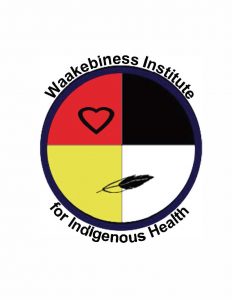April 2025
| April 2025 | ||||||
|---|---|---|---|---|---|---|
| S | M | T | W | T | F | S |
| 30 | 31 | 1 | 2 | 3 | 4 | 5 |
| 6 | 7 | 8 | 9 | 10 | 11 | 12 |
| 13 | 14 | 15 | 16 | 17 | 18 | 19 |
| 20 | 21 | 22 | 23 | 24 | 25 | 26 |
| 27 | 28 | 29 | 30 | 1 | 2 | 3 |
| 4 | 5 | 6 | 7 | 8 | 9 | 10 |
-
Details
Drop-in Ceremony Sacred Fire and Medicine Teachings with Dr. Gokoomis Jacqueline Lavallée
DLSPH Event, Faculty/Staff Event, Student Event, U of T Community Event, WIIH Event
-
Details
Indigenizing Health Symposium 2025: Being Safe With Our Culture Again
Alumni Event, DLSPH Event, Faculty/Staff Event, Student Event, WIIH Event
-
Details
Mike Auksi – ON NEIHR WEBINAR SERIES 2024/2025
Alumni Event, DLSPH Event, Faculty/Staff Event, Student Event
Our Programs
Masters of Public Health (MPH) in Indigenous Health
Our Position Statements
Indigenous Identity Statement
Currently there is much discussion and distrust within, and around, Indigenous communities related to Indigenous identity. The purpose of this statement is to clarify a WIIH position on issues related to this topic in order to provide a tool to help ourselves and others navigate challenging times in a good way.
COVID-19 Context
Indigenous peoples are already highly marginalized within health and social services;
COVID-19 will thus have a greater impact on these populations in these and other ways.
Askaakamigokwewigamig (Mother Earth Teaching Lodge)
About the Lodge:
Askaakamigokwewigamig (Ah-skaw-kom-ih-goh-kweh-whi-gah-mig) was raised on Oct 2, 2020 in the New College Quad behind Ivey Library on 20 Willcocks Street lead by Dr. Debby Wilson Danard, Traditional Knowledge Practitioner, Life Promotion Ambassador, and Provost Postdoctoral Fellow (2019-2021) along with her family (Cameron, Nelson, and Talyn Skye Bell) a dynamic group of faculty members (Maria Hupfield (UTM), Mikinaak Migwans (UTM), Dr. Jennifer Wemigwans (OISE), Nicole Latulippe (UTSC) and volunteers (Doug Anderson and son Nigel Anderson(Wemigwans), Ember Migwans, Dr. Bonnie McElhinny (Principal New College), and Jeff Monague (Park Manager, Springwater Provincial Park).
In response to the COVID pandemic, Askaakamigokwewigamig was built to ensure open air, physically distanced learning on the land while engaging Indigenous knowledge, teachings and ceremony as an essential aspect of continued learning.
Since that time, Askaakamigokwewigamig (the Lodge) has been maintained as a sovereign, self-governing space, by a team of Indigenous and non-Indigenous faculty, staff, students, and volunteers with relationships across the tri-campus of the University of Toronto and in the wider community.
Through October 2020- April 2022 the Lodge had financial and administrative support by New College – University of Toronto – Women & Gender Studies Institute, and funding by The School of Cities inaugural Anti-Black Racism/Black Lives and Anti-Indigenous Racism/Indigenous Lives Funding Initiative (Dr. Debby Wilson-Danard, BEd, MEd, PhD; Dr. Jennifer Wemigwans, PhD; Mikayla Redden, MLIS, New College).
The primary Traditional Space Protocol for the Lodge is: No drugs, No alcohol, No Violence. Her continued presence acknowledges land, healing and reconciliation as the relationship for mobilizing health, strengthening mental health and well-being and life promotion for students, faculty, staff and community attending in-person at the University of Toronto, St. George Campus.
Following ceremony, in April 2022, Askaakamigokwewigamig will continue with financial and administration resources from Waakebiness Institute for Indigenous Health (WIIH).
Respectfully, the student-centered Lodge is further supported with generous consideration and commitment to Indigenous education and mental health research by Associate Professor Dr. Suzanne Stewart who is the Director of WIIH and Special Advisor the Dean on Aboriginal Education and the Chair of the Indigenous Education Network and Assistant Professor, Dr. Angela Mashford-Pringle who is the Associate Director of WIIH, and recent University of Toronto Early Career Teaching Award (2022) recipient for leading U of T’s first land-based masters in public health – Indigenous health (MPH-IH) program and the collaborative specialization in Indigenous health (CSIH) program.
Askaakamigokwewigamig (Mother Earth Learning Lodge) Leadership
Askaakamigokwewigamig will continue to be an “open access” lodge to inspire sustainable and ethical reciprocity and responsibility for Indigenous-led self-determination with land as the central relationship. In recognition of cultural jurisdiction, the Lodge will be considered “the people’s lodge” and will not be dominated or conform to a singular cosmology. The Lodge will respect and acknowledge the many (Turtle Island) Nations teachings, ceremonies and practices.
Currently, the Lodge continues to be self-governing and guided with the following leadership roles:
Traditional Gokoomis (Grandmother)
Dr. Jacque/line Lavallée, Waabizheshi Doodem (Ojibwe Marten Clan) is from Shawanaga First Nation, East Shore Georgian Bay and holds her Doctorate of Social Justice Education (OISE/UT) and Masters of Environmental Studies and Teaching. She is an Ojibwe Traditional Teacher and Traditional Gokoomis (Grandmother) and she holds her Second Degree (Teaching Degree) in the Three Fires Midewigaan. She is also a singer, dancer, song writer and an exceptional storyteller using her own life story as an introduction into the traditional and spiritual aspects of being an Anishinaabe Ikwe (Indigenous Woman). She has been the ‘Elder-in-Residence’ at OISE since 2012 and an active participant in Toronto Indigenous communities.
Elder-in-Residence
Clayton Shirt, is Wolf Clan, Plains Cree/Anishinaabe, originally from Treaty 6 Territory. Clayton Shirt is a traditional knowledge practitioner of holistic health and wellness, lecturer, educator and historian. His worldview and understanding of life is based on living his whole life immersed in learning from his traditional Indigenous teachers, Elders and family. He is currently the sitting traditional knowledge teacher/educator with Waakebiness Institute for Indigenous Health where he is able to bring his traditional perspective and vast experience in ‘walking the good path’ to scholars and educators. He also brings wise counsel and support to Indigenous students seeking higher learning. He was raised and currently lives in Toronto, with his wife and family of three children and his beautiful granddaughter.
Lodge Caretaker
Dr. Hopi Martin, Lenni Lenape/Briton/European, was born in Massachusetts and raised in Tkaronto (Toronto) where he belongs to the Waabizheshi Doodem (Ojibwe Marten Clan) and upholds responsibilities of Gichitwaa Oshkaabewis (Sacred Helper, Messenger, Fire Keeper, Lodge Caretaker). He holds his Masters of Arts in Child Study and Education and a PhD in Developmental Psychology and Education (OISE/UT). Dr. Hopi’s research and practice focuses on Circle Teachings that support cross-cultural, land-based pedagogies at the ‘edge of the bush’ between nations, peoples, and worldviews.
Visit the Booking Request Form for the Mother Earth Learning Lodge
Donate now to the Waakebiness Institute for Indigenous Health Fund

About us
History & Milestones

Our Team

Post-Doctoral Fellows
Partnerships and Networks

Resources & Links

Research

Community Events
Knowledge Translation & Exchange
 Government Relations
Government Relations
Grants & Awards
 Practicum Placements
Practicum Placements
Connect with Us
Linkedin: Waakebiness Institute for Indigenous Health
Twitter: @wbiih_
Instagram: @wbiih_
Facebook: Waakebiness Institute for Indigenous Health
Mailing list: Check back for updates.

